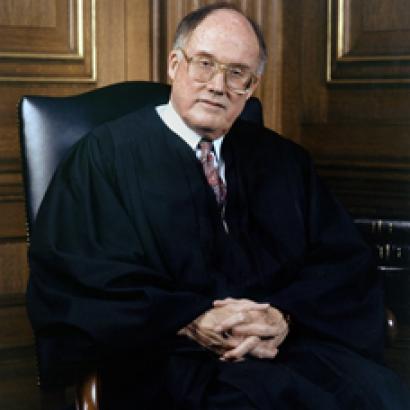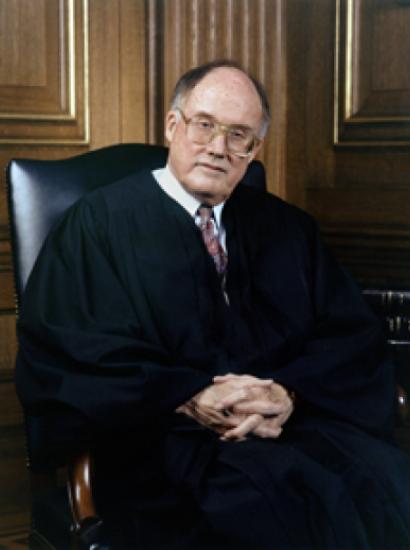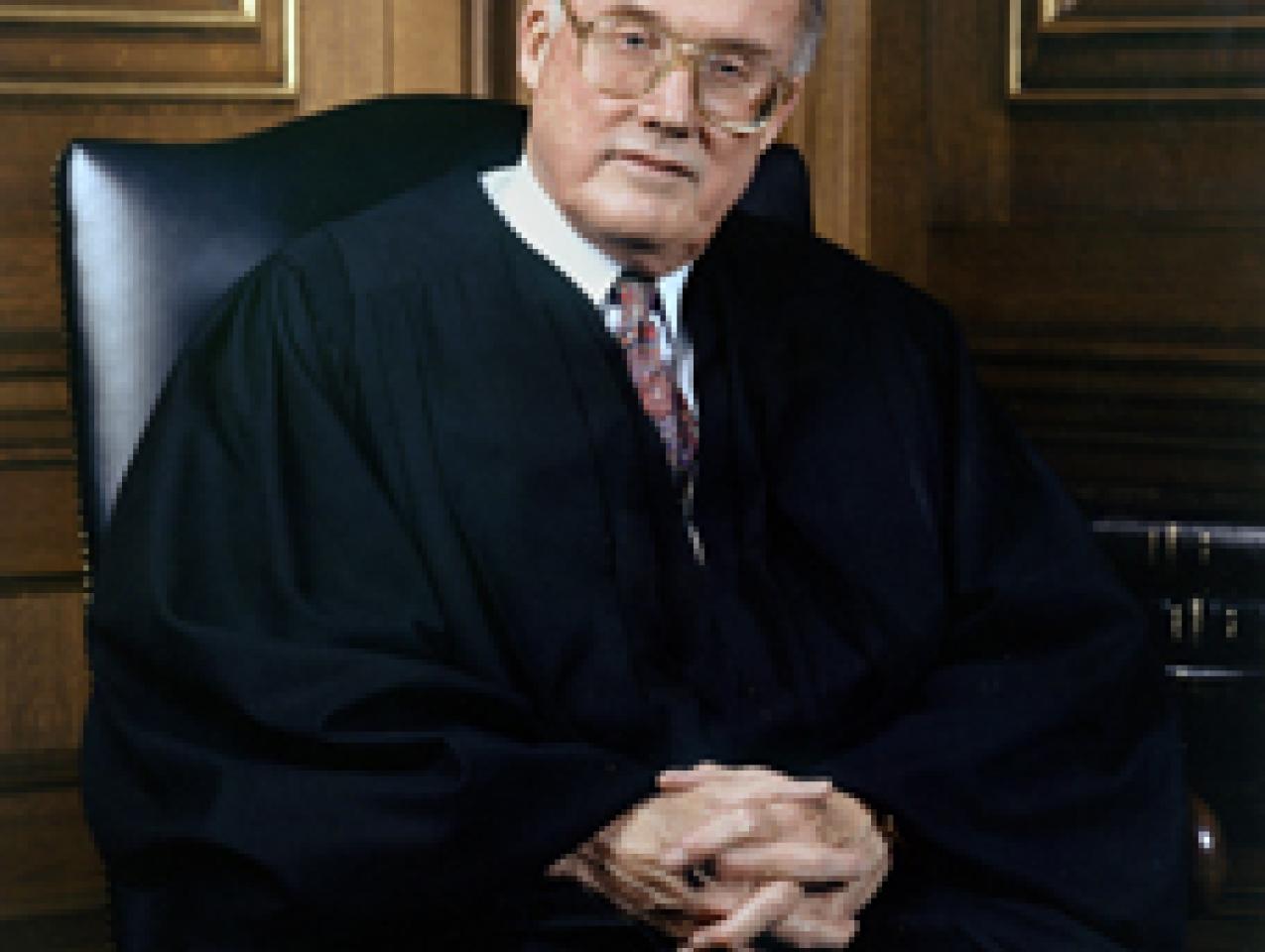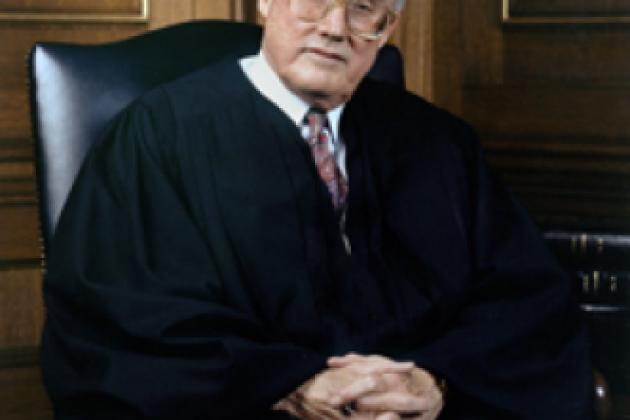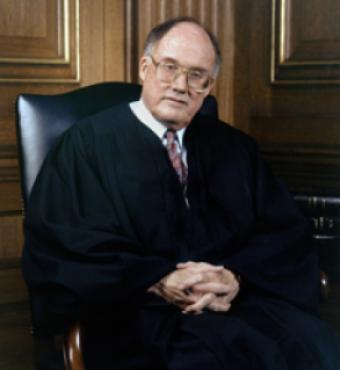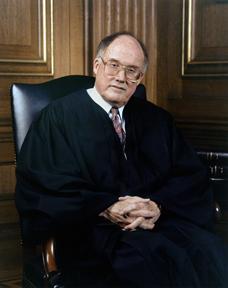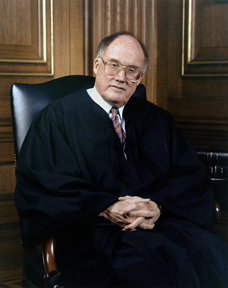
Materials from the papers of the late Justice William H. Rehnquist involving his work from 1947 to 1971 and Supreme Court cases from the 1972 to 1974 terms will be opened to researchers on November 17, 2008, at the Hoover Institution.
New York Times article concerning the opening of the Rehnquist papers
Rehnquist was a Supreme Court justice of the United States from 1972 until his death in 2005.
A finding aid for the materials open on November 17 is available.
Among the files are materials from three high-profile cases from the 1972 and 1973 terms of the U.S. Supreme Court:
- Roe v. Wade, 410 U.S. 113 (1973), resulting in the landmark decision regarding abortion
- Branzburg v. Hayes, 408 U.S. 665 (1972), invalidating the use of the First Amendment as a defense for reporters summoned to testify before a grand jury
- Furman v. Georgia, 408 U.S. 238 (1972), a ruling on the requirement for a degree of consistency in the application of the death penalty.
The materials are part of the vast Rehnquist collection donated to the Hoover Institution Archives at Stanford University and announced publicly on October 22.
Open on November 17 will be
The 1969–1974 U.S. Supreme Court administrative files, including administrative documentation on cases, including stays, opinions, subject files, correspondence conference and order lists, and vote sheets.
The 1972–1974 U.S. Supreme Court Case files contain official printed drafts of each opinion circulated through the justices. Some files also contain short correspondence, memoranda, and other materials regarding the case. In many instances, multiple cases are contained within in one file. In the container list, a “Found in case” notation means that the case is within another case file; a “See also” notation indicates another relevant or similar case. Court files are organized by type of document, then chronologically by term. Case files are then organized by docket number.
Among the case files are materials from three high-profile cases: The Roe v. Wade file, docket 70-18, includes official printed drafts of the opinion along with minimal correspondence. Additional information on the Roe v. Wade case may be found in the Administrative Files from 1972 in the Abortion cases file, which includes the draft opinions and correspondence between justices before the decision, as well as correspondence received by Rehnquist after the decision.
The Branzburg v. Hayes file, docket number 70-85, contains printed drafts of the opinion circulated among the justices, concurring opinions, brief correspondence between the justices, and agreements to dissent correspondence. The file also includes information on case 70-94, regarding Paul Pappas, and case 70-57, United States v. Earl Caldwell.
Information on the Furman v. Georgia case is within the U.S. Supreme Court Administrative files from 1971, in the Capital Cases file. The file also contains information on the following capital cases: Jackson v. Georgia, Branch v. Texas, and Aikens v. California. The four folders of materials include circulated drafts of the opinion, joint memoranda, conference memoranda, per curiam, and concise correspondence between the justices.
Rehnquist's Stanford Law School notebooks from 1951-1952 and a journal with accounts and personal entries dating from 1947-1948 and 1965 will also be opened.
The entirety of Rehnquist’s U.S. Supreme Court Case files for the 1972 through 1974 terms will be opened on November 17. Personal correspondence files will be available by January 5, 2009. Additional materials including speeches, writings, book drafts, and other documents will be opened in the spring of 2009.
Note: U.S. Supreme Court case files and related materials for the October terms 1975–2005 shall remain closed during the lifetime of any member of the Supreme Court who served with William H. Rehnquist.
Rehnquist, an alumnus of Stanford, received three degrees from the university, including his law degree. Rehnquist was nominated to the Supreme Court by President Richard Nixon and took his seat as an associate justice on January 7, 1972. President Ronald Reagan nominated Rehnquist chief justice, a position he assumed on September 26, 1986.
His extensive collection includes case-related materials, speeches, personal correspondence, drafts, and notes on the many books he authored, in-chambers correspondence among the justices. Selected personal material, memorabilia, and artifacts have been sent to the Rehnquist Center at the University of Arizona.
The Hoover Institution Archives is a core component of the Hoover Institution. Originally a repository for documentation on World War I, the archives grew to encompass the records of the fascist, communist, and nationalist movements that precipitated World War II. Today, the collection encompasses persons and political movements from around the world, in both the twentieth and twenty-first centuries. The more than five thousand separate collections in the Hoover Institution Archives include millions of individual documents.




